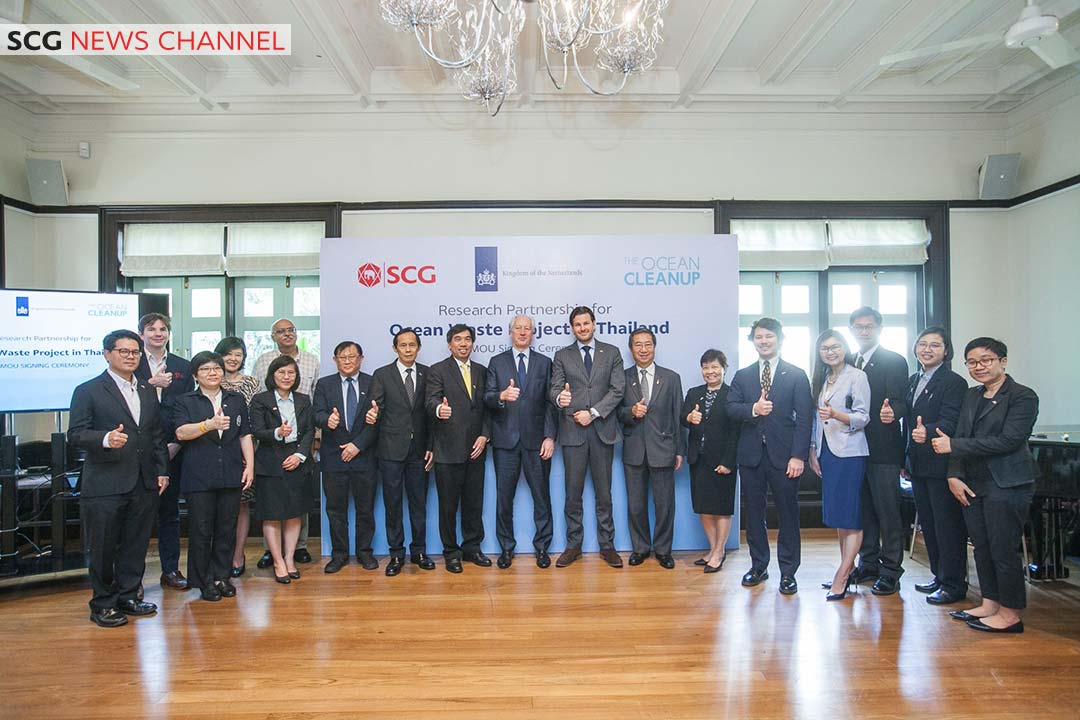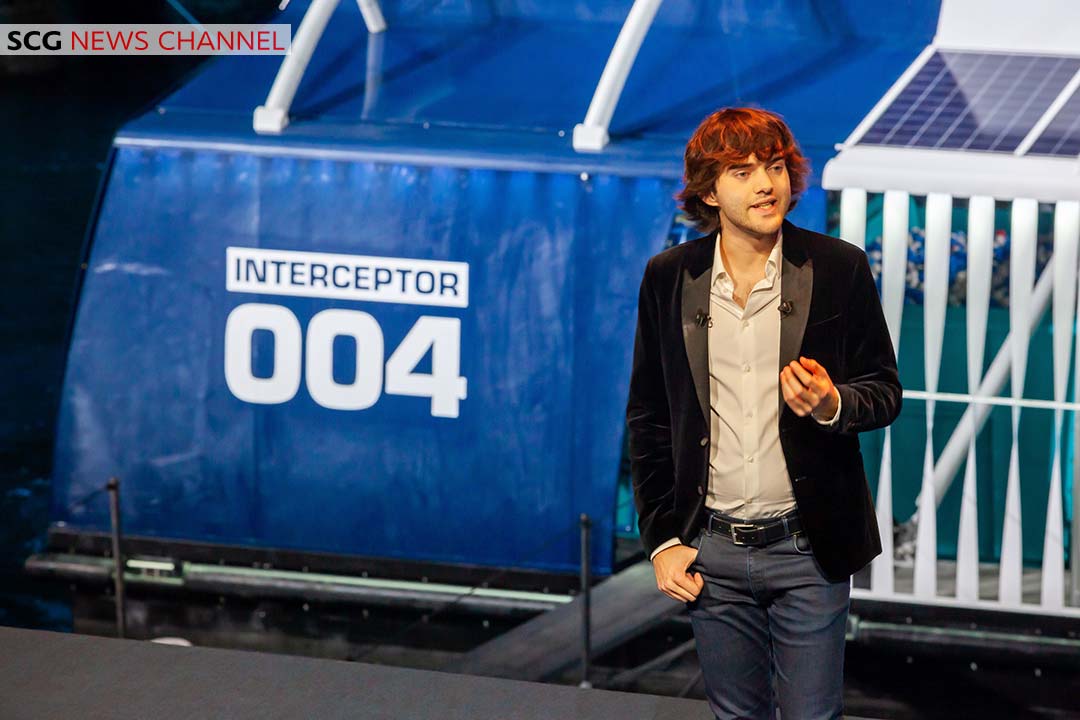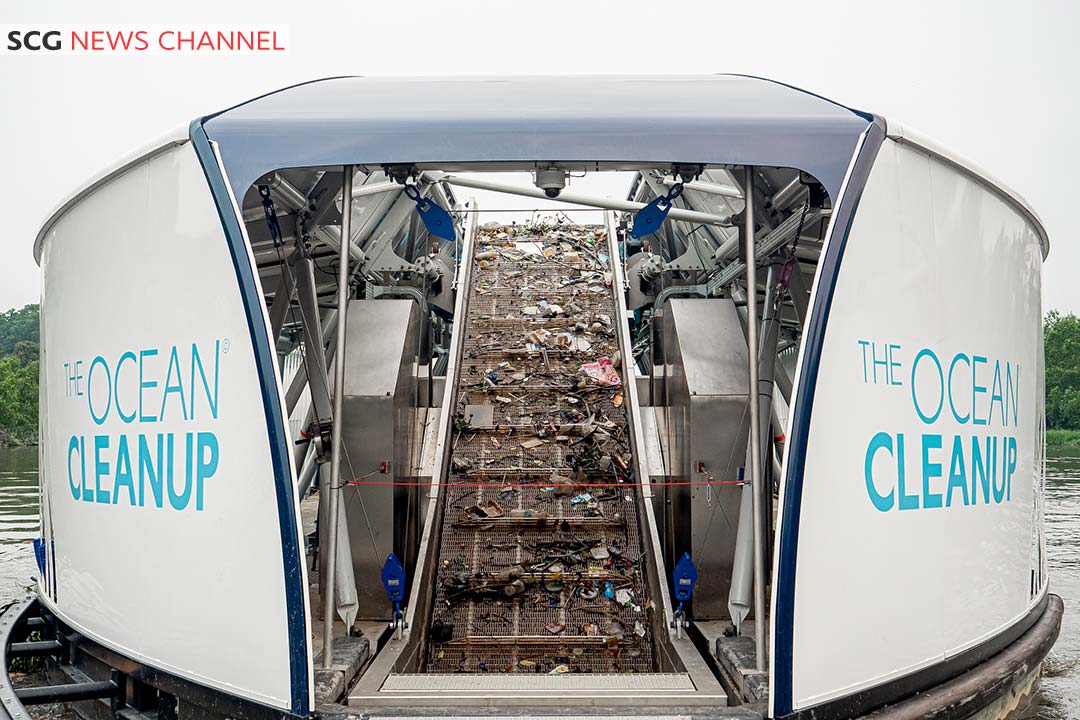The Chemicals Business, SCG, led by Suracha Udomsak, Ph.D., Vice President and CTO – Innovation and Technology, and The Ocean Cleanup, a world-class non-profit environmental organization, led by Mr. Boyan Slat, signed a Memorandum of Understanding for the research and development of ocean waste reduction technology in Thailand. The MOU signing ceremony was held at the Embassy of the Netherlands in Thailand and presided over by H.E. Mr. Kees Pieter Rade, Ambassador of the Kingdom of the Netherlands to Thailand.
This partnership will give Thailand a global frontrunner position in the development of technologies to intercept plastic waste from rivers to end up in our oceans. As part of the project a program for precise and accurate data collection on the waste in the Chao Phraya River is included, which can be used to inform studies on waste management as well as resource recovery and maximization as advocated by the circular economy. In collaboration with the Ministry of Natural Resources and Environment and the Embassy of the Netherlands in Thailand, on behalf of the Dutch government, recently a Memorandum of Understanding was signed with The Ocean Cleanup regarding the installation of an InterceptorTM in Thailand to prevent waste in rivers from reaching the oceans.
Marine waste is an urgent issue that the entire world is working to solve. Currently, Thailand is the world’s sixth biggest contributor of ocean waste. According to the Thailand Development Research Institute (TDRI), most waste is generated by communities, stores, and factories near canals and rivers, beach tourism, and poorly managed landfills. Therefore, the elimination of ocean waste requires multi-pronged measures, the most urgent of which are waste management approaches that prevent waste from ending up in the oceans and with ocean cleanups.

Boyan Slat, Founder and CEO of The Ocean Cleanup said during a short visit to Bangkok, “A large fraction of marine debris originates from waste generated on land that washes into canals and rivers, to finally end up in our oceans. About 1,000 rivers account for 80% of all plastic ending up in the oceans. To rid the oceans of plastic, we need to not only clean up what is already out there, but also stop new plastic from entering the ocean: we need to close the tap. Working together with government leaders and private corporations, our goal is to tackle these 1,000 most polluting rivers, all over the world, by 2025. The InterceptorTM is The Ocean Cleanup’s answer for river plastic waste. It is the first scalable solution to prevent plastic from entering the world’s oceans from rivers. Currently, two systems have been deployed in Indonesia and Malaysia, with a third one being installed in Vietnam and three more planned for the Dominican Republic, Los Angeles County (USA) and Thailand, respectively. I am looking forward to work with our partner SCG, building on its passion for tackling the issue of ocean waste, to scale up our efforts in Thailand as quickly as possible.”

H.E. Mr. Kees Pieter Rade, Ambassador of the Kingdom of the Netherlands to Thailand, said, “The Netherlands is an expert in applying the principles of circular economy and technology as well as in seeking new approaches to waste management. The Embassy of the Netherlands is very pleased to be collaborating with a Thai private organization such as SCG and The Ocean Cleanup. We will work together to solve ocean waste problems for environmental sustainability.”
Suracha Udomsak, Ph.D., Vice President and CTO – Innovation and Technology, stated that, 80 percent of ocean wastes come from land and have affected every life on earth. Waste management, waste sorting, and proper disposal to prevent waste leakage into rivers are keys for tackling the problem. However, the cleanup is essential, and R&D of waste interception technology in rivers and oceans can also help reduce the amount of pollution that ends up in the oceans. SCG’s partnership with an expert such as The Ocean Cleanup will enable us to better tackle social and environmental issues. SCG will also work with the Department of Marine and Coastal Resources and other relevant agencies to accurately collect data on waste in the Chao Phraya River and study the possibility of making use of marine debris as resources and maximizing its usefulness.”
